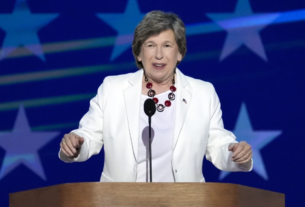A recent AP-NORC poll reveals strong support among Americans for increased border security, but opinions diverge on broader immigration policies. The poll indicates that while a majority agree on the need for stricter controls at the U.S.-Mexico border, there is little consensus on issues like citizenship pathways for undocumented immigrants or expanding refugee admissions.
Border security has consistently been a point of agreement across party lines. The poll found that a significant number of Americans favor policies that aim to secure the border and reduce illegal immigration. Support for measures like building physical barriers or increasing surveillance technology is exceptionally high among conservatives, but many liberals also back steps to curb illegal immigration. However, they tend to emphasize humanitarian protections. The general agreement on border security shows a shared concern over the challenges of illegal immigration.
The divide emerges when the conversation shifts to broader immigration issues. While the public largely agrees on the need for border security, opinions split over how to address the status of the millions of undocumented immigrants already in the U.S. Proposals like offering a pathway to citizenship for undocumented individuals face strong opposition from some groups. Similarly, expanding refugee admissions or providing legal status to certain undocumented workers remains a contentious issue. These divisions make it difficult for lawmakers to craft policies addressing the full spectrum of immigration concerns.
This lack of consensus complicates efforts to pass comprehensive immigration reform. Lawmakers in both parties have long struggled to find common ground on immigration. While some advocate for a more inclusive approach, others call for more onerous restrictions. The public’s divided opinion on what to do with the existing undocumented population mirrors the challenges that Congress faces when attempting to create policy solutions that satisfy all sides. The gap between support for border security and the reluctance to address the status of undocumented individuals shows the complexity of the immigration debate.
The poll also highlights a disconnect between public opinion and the legislative process. Many Americans believe the government should do more to address the needs of immigrants, particularly those who have been in the country for years and have established lives. Some argue for legalizing undocumented immigrants who have been productive members of society, while others remain concerned about the economic and social impacts of such policies. At the same time, there is growing frustration with what some perceive as ineffective government action on immigration reform. This frustration has fueled debates about how to strike a balance between securing the border and addressing the needs of the immigrant community.
This divide also plays out in how people view the role of refugees. While some Americans support expanding refugee admissions, others feel that increasing the number of refugees could strain public resources. The refugee issue ties into broader concerns about immigration policy and national security, with some advocating for more stringent vetting processes. The differing views on refugees, alongside the broader immigration debate, illustrate the difficulty in achieving policy consensus that balances security with humanitarian needs.
Ultimately, the poll shows that while Americans agree on specific aspects of immigration, such as border security, they remain deeply divided on more complex issues like legal status and refugee admissions. The lack of consensus on these matters means that meaningful immigration reform will likely require significant negotiation and compromise from both parties. Without such compromise, it is unclear when or how comprehensive immigration reform will take shape. The public’s mixed opinions create obstacles for policymakers navigating these complex issues.
As the debate continues, border security remains the focal point for many Americans. Yet, the broader immigration issues that follow will require difficult conversations and a willingness to address concerns from all sides. The challenge for lawmakers is to find common ground on these issues or risk prolonging a divisive and ongoing debate. The future of U.S. immigration policy depends on the ability of both sides to work together and address the full spectrum of challenges the country faces.




